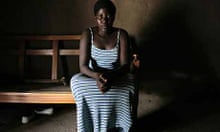Welcome to Katine.
In October 2007, the Guardian and Observer embarked on a three-year project to support development work carried out by the African Medical and Research Foundation (Amref) and Farm-Africa in Katine, a rural sub-county of north-east Uganda.
The project was launched by the editor of the Guardian newspaper, Alan Rusbridger.
The £2.5m project is being funded by donations from Guardian and Observer readers and Barclays, which initially gave £500,000 to the project and will match-fund donations over the course of the project up to £1m. You can read more about our partners here.
But the Katine project is more than just a fundraising push. On our dedicated Katine website you will get the chance to find out how the money is spent, how development works (the successes and the failures) and how the lives of the sub-county's 25,000 inhabitants have changed.
The project is focusing on five key areas, and improvements in each will be recorded in dedicated sections on the site. So, you can find out about the project goals and catch up on progress in education, health, water, governance and livelihoods at the click of a button.
An important part of the Katine project is listening to its residents – finding out about their lives and giving them a forum to express their views, not only on the work of Amref and Farm-Africa in their communities, but also on the decisions made by Ugandan politicians in Kampala that could impact their lives. The NGO Panos, which works to strengthen media, debate and information in developing countries, will hopefully help empower locals to tell their stories, which you can read in our village voices section.
Throughout the project we will be attempting to put the work going on in Katine into context by reporting on Uganda's history and politics, including the war being waged in the north of the country by the Lord's Resistance Army, a war that has directly affected Katine.
We will also explore the wider issues of international development in our aid and development section.
Over the course of the project, Guardian and Observer journalists will visit Uganda to report on progress. We have also employed an award-winning senior staff writer from the Weekly Observer newspaper in Kampala, Richard M Kavuma, to spend two weeks each month in Katine to write regular news reports.
An independent moderator, Rick Davies, has been contracted by the Guardian to visit Katine to see if the work being carried out by Amref and Farm-Africa on the ground corresponds to the project plans. Regular reports will be published online. The first can be read here.
Obviously, fundraising for the project is important, and there is a page on the site that explains the different ways you can make a donation.
We are also encouraging schools to get involved in the project through our school resource section, which contains ideas for raising money, videos and lesson plans that can be downloaded.
All of the work going on in Katine is being captured through the written word, pictures, audio, and video, with a number of films produced by GuardianFilms. There is also a helpful interactive map of Katine, which allows you to take a virtual tour around the region. You can read more about the project on our Frequently Asked Questions page.
We believe the Katine project can offer a unique insight into the world of international development, so tell us what you think. Join the debate on our Katine Chronicles blog, or email me, the Katine website editor, at katine.editor@theguardian.com, with any comments or suggestions you have for the site, or on the project.
